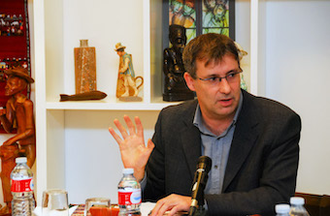The mysticism of Muhyiddin Ibn Arabi: A Christian appreciation

Professor Jaime Flaquer SJ
The Islamic Studies Association in Delhi, India, hosted a webinar on 5 August, 2024, titled 'The Mysticism of Muhyiddin Ibn Arabi: A Christian Appreciation,' featuring Professor Jaime Flaquer SJ from Loyola University, Spain.
Muhyiddin Ibn Arabi (d. 1240) was a mystic, philosopher, poet, and sage, born in Murcia in Arab Al-Andalus. His writings had a profound impact across the Islamic world and beyond.
Ibn Arabi recognized God as a Being, beyond all beings, who is Infinite, Timeless, Spaceless, Absolute Existence and the Only Reality. For him, the world, as the self, are limited realities that derives their conditional existence from the Absolute Existence, wherein the self (once fully united to the Only Reality) vanishes like a drop in the ocean of this Absolute Existence. Individual selves are like waves in the sea that do not have an existence of their own, but only ebb and flow in time, vanishing in the vast expanse of the waters of the sea.
Ibn Arabi was influenced by the philosophical ideas of Plotinus (c. 270 AD) who studied philosophy in Alexandria, a famous hub-city of Greek Philosophy and Oriental Wisdom. According to Plotinus, the world exists between two poles: divine light, which he refers to as God, at one end, and absolute darkness at the other. Plotinus argued that darkness does not exist. He believed that the soul is illuminated by the light (the Divine) and that their natural forms carry a faint reflection of this light. He also maintained that the darkness beyond is not Divine. According to him, God illuminates the soul, and we can perceive the divine light, in varying degrees, in all living beings, depending on their proximity to the Divine. For Plotinus, all things (created through the medium of the 'First Intellect') are One and a manifestation of God.
Like Plotinus, Ibn Arabi believed that (between God and creation) there exists another created reality through which God brought all things into existence, which he referred to as the 'reality of Muhammad (al haqiqa al Muhammadiya)'. He quotes a Hadith in which Muhammad said, "I was already a prophet" rather than "I was a man" or "I already existed." This implies that Muhammad possessed prophecy before the other prophets who represented him in the world. Ibn Arabi similarly stated that all creatures reflect the 'reality of Muhammad', but that there is only one creature that embodies all the qualities of the 'reality of Muhammad', namely, the Prophet Muhammad himself. According to another Hadith, "I was already a prophet when Adam was still between the water and the mud." This suggests that Muhammad, who encompasses the 'reality of Muhammad', appeared as the last in the chain of the prophets, as he is the Last Prophet and seal of Prophecy.
Again, like Plotinus, Ibn Arabi affirmed that God is one and God alone exists. He expressed the unity of oneness as (wahdat ul wajud); the wujud (existence) is one. Ibn Arabi proposed that God opens his self and manifests himself in the plurality of things all created through the 'reality of Muhammad' and affirmed that all created reality yearns for God in every moment of history. When this yearning comes to fruition in the life of one saint who truly knows God, this Saint can be spoken of as a pole who sustains the world.
Ibn Arabi also expressed a deep connection to, and gratitude for, Jesus, whom he described as his "first teacher" who led him back to God and took care of him. He spoken often of his hope to witness Jesus's second coming and believed that Jesus had prayed for him to remain faithful in this world and the next, even referring to him as "my darling" who had instructed him to embrace renunciation and asceticism. Ibn Arabi stated that in drawing near to the presence of Jesus, he felt love-struck as if intoxicated by divine love, clearly associating Jesus with divinity, but stopping short of strictly identifying him as God.
The lecture ended with a conversation on Islamic mysticism. The participants felt that mysticism, present in all religions, is a powerful spiritual force. It cannot be attained through any intellectual means; it is an understanding of reality that transcends conventional consciousness. The mystic's ultimate goal is indescribable and cannot be fully comprehended through normal perception; only the wisdom of the heart can provide glimpses of it. A mystic follows an inner light, which grows stronger as he/she detach themselves from worldly desires. True mystics are more than just an ascetics; they are filled with divine love. This love resides in the mystic's heart, enabling him/her to endure any suffering or trials that serve to purify them.


















